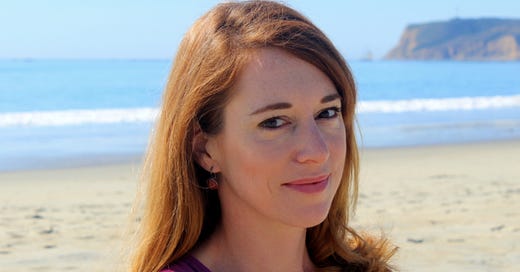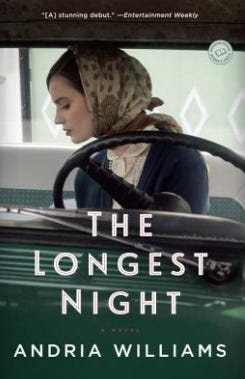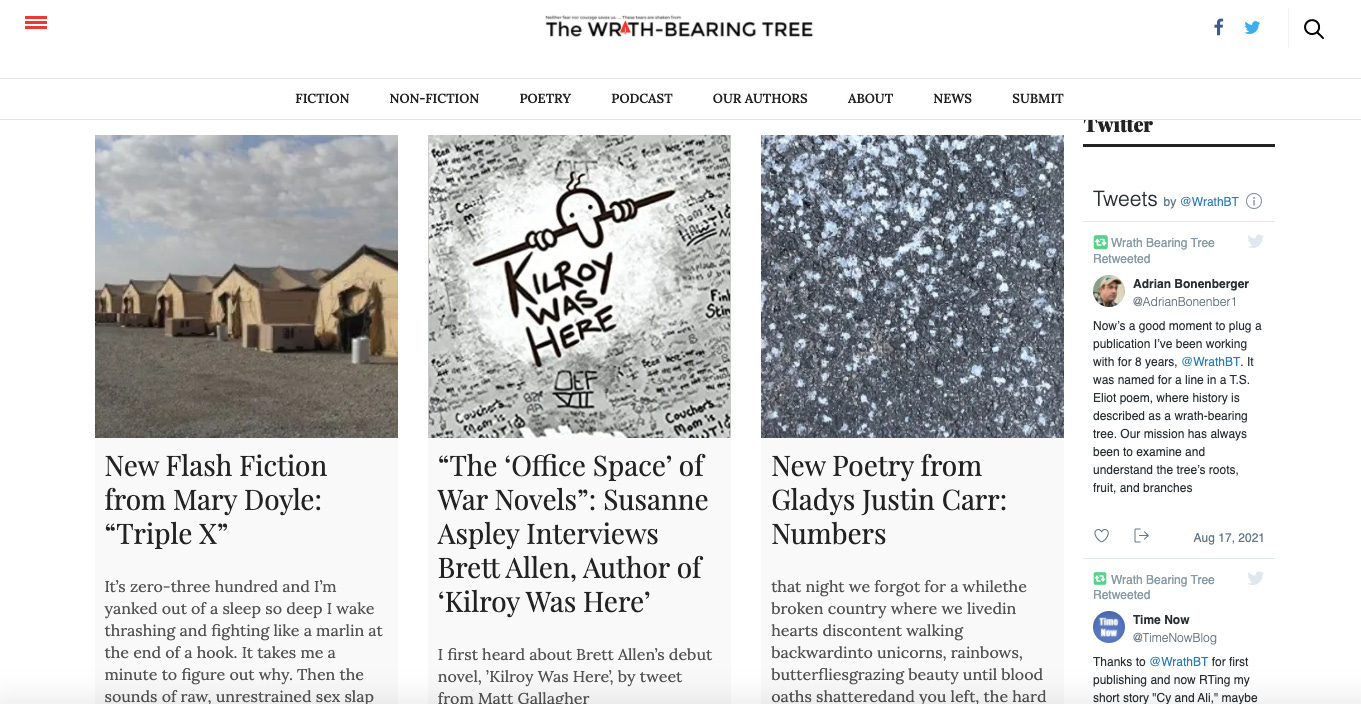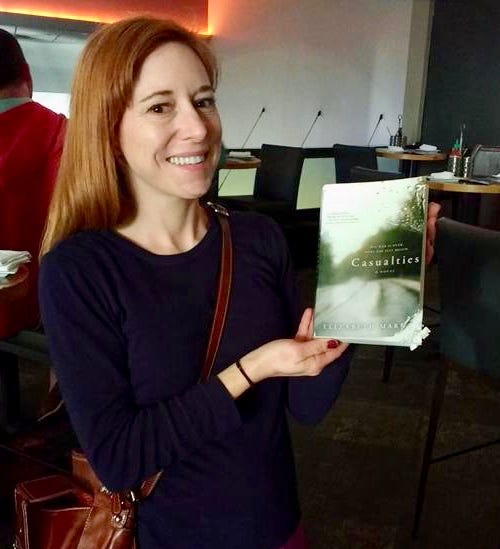One Writer's Journey: Andria Williams
Spark Interview: The Writer's Journey Series #3
Welcome! You’ve reached Spark. If a book club married a writer’s group, this community would be their child. Learn more here or just read on. If you received this from a friend, please join us by subscribing. It’s free! All you have to do is press the button below. Thanks for joining us!
For a long time, I wondered if Andria Williams ever slept. I’ve followed her since I found her blog, The Military Spouse Book Review, when I was still writing Casualties. She gave me my first glimpse of military life from the family’s point of view and, also, a writer’s. Oddly, among the moments I retain from that blog was the tip about a long-handled gizmo that enabled her to apply lotion to the middle of her back; her children were too small to help and her deployed husband was too far to provide assistance. I remember laughing and then immediately wanting one myself.
Andria was writing her own novel then, usually from 4:30 to 7:30 a.m. She kept the schedule no matter what. She once posted a photo of her laptop on a motel toilet which she was using as a desk while en route from San Diego to her new home base in Colorado Springs. It was hard not to feel like a slacker, rising as I did at six or seven without anyone to worry about except my mate and he could feed himself.
Then her novel, The Longest Night, came out in 2016 and it was amazing. In those dark hours of early morning she’d been spinning a beautifully constructed tale based on a true incident that took place in the Fifties - a near meltdown of a nuclear reactor in the Midwest. Against the suspenseful backdrop was the story of a marriage strained by distance and feelings of isolation. She wove both stories together in a page-turner that was written in elegant, lyrical prose and with a sense of humor. Critics and readers alike loved the book.
She has written another novel and, in the process, has discovered that each book has its own lessons to teach, some surprising, some painful. She is sustained by her love of writing, of books, and by helping to bring the work of other writers to the attention of readers as part of the editorial team at the literary journal Wrath-Bearing Tree.
But first, the official stuff.
Andria’s Bio
Andria Williams is the author of The Longest Night, a story inspired the true story of the only fatal nuclear accident to occur in America, The Longest Night is a deeply moving novel that explores the intricate makeup of a marriage, the shifting nature of trust, and the ways we try to protect the ones we love. The novel made its debut in 2016 to acclaim from critics and is published in several languages throughout the world.
A native of northern California, where her parents were public-school teachers, Andria Williams attended UC-Berkeley (B.A. English) and the University of Minnesota (M.F.A. – Creative Writing).
She and her husband, an active-duty naval officer, have three children ages 14, 12, and 8. They have been stationed most recently in Virginia, Illinois, California, and Colorado.
Andria is an editor for Wrath-Bearing Tree literary journal. She also runs the Military Spouse Book Review blog, which promotes the writing of women veterans and military spouses and publishes book reviews and essays. The Longest Night is her first novel.
You can also find her on her website, Instagram, and on Twitter.
And here is her book, The Longest Night.
Now, let’s dive in.
First came Petey and then an M.F.A.
Betsy: So, how did it all begin for you?
Andria: I started writing really long stories when I was about four, which is very young. And when I was six, I wrote a 30 page story called “Petey The Half-Stray.” It was about a dog that would escape from his house, and stray around the neighborhood. But it was 30 pages long. And my really sweet great-aunt, who was the only family we had in the area at all, typed the whole thing for me. I illustrated it and she Xeroxed it for me. I owe her. I've been writing since I was really little. It's the only thing I've ever known for sure that I wanted to do. So I'm very lucky that I get to do it.
Betsy: After you graduated from Berkley, you went for your M.F.A. at the University of Minnesota. How did that impact you as a writer?
Andria: I think it accelerated my writing. I made probably ten years worth of progress in those three years. I just blasted through everything, all the mistakes I was making, all that floundering and weird posturing and weird, self indulgent narratives. Then just exposure to other people's writing is so helpful. The connection still lasts. One of my thesis advisors and I just swapped novels and were reading each other's novels and making notes. My first reader for The Longest Night was my good friend, Rob, who I met there. It just meant a lot to me because I sent him sections of my first book, and I thought they were crap. And he was like, no, I think this could be a book.
That experience was completely fundamental in my understanding of myself as a writer, and I feel so supportive of all the people I graduated with, we're all still friends on social media cheering for each other. I'm blurbing their books, they contribute to Wrath-Bearing Tree. It’s been really good. I know other people who had negative M.F.A experiences, just like mad personalities, weird egos. Ours was not like that at all.
Next: two books and two entirely different experiences
Betsy: Where are you with your second novel and how does the experience compare to your first go-around in the world of writing and publishing?
Andria: As for my own writing, oh, it's been rough. I published my first novel in 2016 and I had kind of a Cinderella experience. It felt like everything fell into place really easily. The book got more attention than I thought it would. I was proud of the book, and I'm still proud of it. So far, though, I have been unable to publish my second novel. Honestly, this is one of the first times I've talked about this, because I was sort of embarrassed about it. People are asking me about my second novel, and I've kind of been like, oh, you know, it's still in the works, and now I'm realizing it might be at the point where it might not get published.
I am feeling okay with being honest about that. I don't expect everything I write to get published. I don't expect everything to be easy. I'm still waiting on some news from a few places. But if it doesn’t work out, then I need to kind of pick up the pieces and just start a third novel. I mean, that's kind of how it goes, right? Like, when your business is creative capital, you have to accept the fact that people might not always want what you are putting out. That’s hard because it's like your soul, right? So you're like, alright, maybe they don't want this part of my soul. Maybe they want another part. You know? We can pick my soul and carve it up (she laughs). Yeah. So that's where I am with my second novel. I worked on it and worked on it for about four years. You know that it is a mind- boggling amount of work, and you just hope that someone else will see value in what you've made. Sometimes they do. Sometimes they don't. And it's hard because you have to kind of roll with it and not get too upset.
“But if it doesn’t work out, then I need to kind of pick up the pieces and just start a third novel. I mean, that's kind of how it goes, right? Like, when your business is creative capital, you have to accept the fact that people might not always want what you are putting out. That’s hard because it's like your soul, right?” - Andria Williams
Betsy: Your first novel was published by Random House. Is it possible you’ll end up going with a smaller publisher now?
Andria: I’ve started to realize it might have to if it's going to have a life outside of me so I've started to submit it to very, very small presses. I don't know if this novel is too much in between kind of a mainstream thing, which I did before, and me deciding I was just going to do what I wanted.
Betsy: What has this second novel given you?
Andria: Even if this novel does not get published, I still feel like I learned a lot. It’s set between World War I and the 1930s. It required even more research than my first novel, which was set between 1959 and 1961. That culture and time were more accessible to me than the culture of 1929. I just didn't know a thing. I didn't know the music, I didn't know anything. So I had to go in and look at the ads and listen to the music and all of that. So even if this novel doesn't get published, I feel richer by what I consumed from that time period.
“That's what it is to be a novelist — you immerse yourself with this sort of incredibly deep curiosity. Even if this novel doesn't see the light of day, I learned so much and was able to immerse myself into a world of made up people that I still care about.”
Betsy: Did you try anything with this novel that you wanted to try? Did it feel valuable in other ways to you, from a writer's perspective?
Andria: It really did. When I started out to write it, I was like, I'm going to write a novel set in the first person perspective. I’ve never been able to. I still cannot. I don't know how anyone does it. I ended up with four narrators. I've learned that it's almost impossible for me to stick with one narrator. I'm not sure why that is. It’s kind of a mixed bag because I think a lot of people find the focus a little diffuse if you have multiple narrators. I may have let that happen. So that was interesting for me. I also tried using sort of a different point of view kind of perspective for each narrator. So one was in the second person, one's in the first person, one's in the third. It was really fun for me to write this this way butt I don't know if that hangs together for every reader. So that was another learning experience for me. But that was kind of an experimental thing because like my first novel, there were three narrators or three sort of points of view, but they were all in the sort of distant third person that Jonathan Franzen says every novel should just be in. It does work really well, I can't really argue with it but I tried changing that up. It was really fun to immerse myself in these four really different people and try to make a story come together. I think what happened was that I wanted to write kind of an action story. But at heart, I'm a very literary writer.
Hunger, motels, and then facing fatigue and the pandemic
Betsy: I remember following your move on social media from San Diego to Colorado and at one point, you showed a photo of your laptop in a motel bathroom at 4 AM where you were working.
Andria: With my first novel, I had a hunger that woke me up at 4am. When my littlest daughter was born, I gave myself four days off. And then I was up at four again, writing. When my youngest was born, I was really in the heart of finishing up The Longest Night. She was a newborn, so I could get her to bed at like 7:30 or 8. Then I would get to bed around 11 or so. The good thing was that she'd get up almost like on the dot at 4:30 AM to nurse. And if I could make myself stay up, I could nurse her and get her back to bed, really nice and full. Then she'd sleep till 7:30. So I would have those three hours. And I would write my ass off. But I was like a shell of a human by the end of a few years. I mean, I actually was driving one time and started to fall asleep and bumped into the highway median. I was that tired.
Betsy: You started writing this novel before you had published the other one, right? I remember seeing you in a motel room working on it.
Andria: Yes. I went to the worst motel room and I cannot believe I survived this experience. I was almost finished with the draft. And so my husband was like, okay, take a night and just go off somewhere because I can write all night if I really get going. I really needed to finish this. So I tried to find the cheapest motel room in Colorado Springs which ended up being this place that was disgusting. I had to sign a waiver saying that I would not have any guests while I was there. I was like, how about you sign a waiver that there won’t be any roaches? There was this drained pool, a pit bull running circles around it, and this lady like cursing at it. So I went to my little room, and I was writing. At this point I thought I was done with the book. That was about four years ago.
Betsy: What’s it like now? How has the past year impacted you and your work?
Andria: Now I wake up at seven. I'm trying time squeezing a little writing when I can. For the first time in my entire life, I'm not showing up every morning to write. And I know that that makes a huge difference. Because I'm not writing. I think I'm just less diabolically driven as I was at that time; I have other things in my life that make me feel good.
I'm also older. So it's like, it's just a very weird time. Yeah, and I'm trying to just go and not be too hard on myself.
It’s partly because my husband is gone on deployment and I've had the three kids not being in school for the past year. We don’t have family in town so it’s just me. Right. So there is pressure there. And this is not to blame them. They're wonderful, wonderful children. I made them! It was just easier for me to get up early to write when I had two or three children that I could put to bed at like 7:15. Now I have two teenagers. And so I get the little one to bed and the older ones want to have special mom time. By the time I get my youngest to bed, my son already has the X Files queued up. I just feel like especially with my husband gone for so long, and then they were not getting to see their friends. I'm kind of their big emotional touchstone right now. So I'm treating this as just a different time. I’m directing my writing energy towards Wrath Bearing Tree which I love.
Shifting gears: Wrath-Bearing Tree
Betsy: What is your role at Wrath-Bearing Tree?
Andria: I’m actually the editor-in-chief of Wrath Bearing Tree right now, we don't really have a masthead and we don’t make a big deal of it because we work so tightly as a team. Having the structure is important because we are seeking not-for-profit status which will help us grow and be able to pay writers.
Wrath-Bearing Tree was founded by combat veterans and now has a wide variety of editors. I’m a military spouse, for example, so I’m connected with that world even though the perspective is very different. I am also one of the fiction and nonfiction editors. We get such a variety of work that we can showcase in a way that is just really cool. For a lot of people who publish with us, it is their first time publishing anything. We also get really established voices who are their third book, and we're publishing an excerpt. It’s just really fun. One of our writers who had an essay collection just won a prize. That makes me feel so good.
I feel invested in it because I got so much help and because I just feel like we're all working so hard and we need to help each other get our writing. out there because it's so wonderful, you know, so, um, hang on, I think I lost the plot at the question. But so for me, that's what part of being with Wrath-Bearing Tree is, the only reason I'm editor in chief, which is not even publicized, and I never tell anyone really is just because we had an election. But the real heart and soul of the daily work of the journal is Michael Carson. He works really hard every day, behind the scenes, he's the chairman of Wrath-Bearing Tree. He’s been spearheading the whole nonprofit transition. He also works really hard and does a ton of editing,
It's kind of addictive. You’ve got this rush of activity and then you put it up there and get to see a result, which is obviously the opposite of writing a novel. We can get a little bit of immediate positive feedback which is a boost. We’re working really hard on establishing an imprint, which we're very excited about so we can publish books. We're hoping to be able to read a few books by people who share our interests a year.
Helping writers feeds the writer
Betsy: A platform like Wrath-Bearing Tree can help a lot of writers by introducing them to readers who might have missed them otherwise. For example, I first read Lauren Hough’s work there and that’s what got me to follow her on Twitter and all that. Then, suddenly she was famous.
Andria: Lauren would be famous right now no matter what she did not need Wrath-Bearing Tree at all. But it was actually really fun. She is so talented. The connection between Lauren and me is that we were represented by the same agency. So I knew Lauren, and I had read a draft of her novel for her, which always makes me feel very close to people. When someone asks me to take a look at a draft of their book, I take it very seriously. I do not mess around. So I read it within like two days or something and gave her my notes. So, when I started as an editor at Wrath-Bearing Tree, I just wrote to her to see if she had any writing to share. She sent in this wonderful two, two-part essay that ended up being the first part of her book. But she’d written a piece for Huffpost, called “I Was a Cable Guy” that went completely bonkers-viral. Wrath-Bearing Tree normally gets several hundred people a day looking at it, which we feel is fine. But it blew up to like 10,000 or 12,000 or so, I don't even remember, but it just blew up. And so she helped us much more than we helped her.
The whole idea of literary citizenship is very important to me. I’ve benefited when people have helped me and I see how it helps writers. There are authors like David Abrams, Phil Klay, Matt Gallagher, Peter Molin, and others who just continuously give back to the community. Siobhan Fallon, too. She championed my book really, really early before anybody. I remember her introducing me to Peter and saying “her book is really good.” That was so helpful and supportive.
Betsy: Does working on Wrath-Bearing Tree fill any needs that aren't met by working on a novel?
Andria: Oh, I would say absolutely. I would say that this was the thing that I was looking for, and the thing that I needed, especially because my writing life is very isolated. After finishing my M.F.A. My husband enlisted in the Navy and then I got pregnant. I transitioned within the space of a month into a military wife lifestyle, it happened very fast. We left Minnesota for Virginia when I was seven months pregnant. We knew literally no one, not a single soul. It was just a very fast transition from this cozy life where I was surrounded by writers all the time talking about books and then all of a sudden, I was in this apartment complex in Virginia, hugely pregnant, and everyone around me was in a very different mode.
That’s when I started The Military Spouse Book Review. I was trying almost anything I could to connect with other writers. I have wonderful friends but most are not writers. So being able to participate with Wrath-Bearing Tree does feel a need. It's so encouraging to me — I’m not the only one trying to do this stupidly impossible thing.
It’s stimulating. I read poems, essays, and stories with approaches I've never thought of. That's freaking awesome. And then it gives you a good feeling to be able to tell a writer “yes, we want this.” And people are so happy. It’s just a wonderful thing. And it's like we were saying, a novel takes so long, but this issue of Wrath-Bearing Tree is something we can make every month and it will be up there for as long as the internet allows us to function.
“I read poems, essays, and stories with approaches I've never thought of. That's freaking awesome. And then it gives you a good feeling to be able to tell a writer “yes, we want this.” And people are so happy. It’s just a wonderful thing.” - Andria Williams
Time + writing = unknown
Betsy: I was struck then, as I am now, by how crammed your days must be and how the writing still happens. Sometimes I wonder if being flat out busy helps or hurts the writing. What was your experience?
Andria: Well, and I wrote a novel that I felt was successful within the ways I hoped it would be at a point in my life when I had small children and not a lot of free time. Once the kids were older, I had much more free time but my second novel is not yet published. I assumed that once I had all this free time that I was going to just be an unstoppable force, you know. Then pandemic hit, my husband's on his one-year deployment that has turned into eighteen months.
But even before then, the second novel just wasn't working the way I wanted it to. And so I just have to realize that time is part of it, a huge part of it. And I think we need to try and make as much time as we can, especially, I think a lot of women writers especially get very bogged down with their responsibilities before they can write. I have friends doing this and it's a daily struggle. We’re like, I need to play imaginatively with my kids for two hours before I can write, you know, these things that are very real, you know, very real emotional, things that are important, because you do want your kids to feel valued and loved. You need to also show that they can also respect your time, so you have to find that balance. But when I had more time, I didn't write a more commercially successful novel. I don't know what that means.
“I think it means that I need to try again. That's a hard thing to think about, you know, to try, again, from scratch. Like, I need to start with page one. I have to start drafting these characters, and then I need to write for five more years, you know, it's just, that's how I think my writing career is going to be.” - Andria Williams
Military Spouse Connection: Intersection of Writing and Military Life
Betsy: I came across you first through the blog you founded, The Military Spouse Book Review - what role did that play in your journey as a writer?
Andria: When we were in Virginia I tried various things to connect with writers and also with others in my situation. I started up the military spouse book review, which is in a little bit of a sort of hiatus, but I hope to revive it because it has meant a lot to me over the years. It was a place where military spouses writers and members of the war writing community intersected. I have all these wonderful military spouse friends but we move around so much that we are all leapfrogging around and passing each other. That’s why the Internet has been so important for the war writing movement and for me - it has really allowed everyone to have a sense of connection.
Each book is a life
Betsy: What’s next?
Andria: I'm a little bit a little stuck, because I'm not sure what I'm going to be writing yet. I've started a couple things but I'm not at that point where I've seized on one project and am just rabid to continue it, which happened with the last two books. It needs to be the right one; it will require a crazy amount of investment intellectually, emotionally and will take a lot of time.
When people buy a novel, they pull a book off a shelf they don’t see it as anything besides a book. And you're like, Okay, yes this is a book but you know, this person has put five, six, ten, maybe 15 years into this — begging time from their spouse, begging time away from their children, stealing moments, researching, thinking about it when they're pushing their cart through King Sooper’s. When you buy a book, it’s like buying a life.
There have been times where my first book has been on sale on Audible for like, 99 cents for like a flash sale day. A Starbucks coffee would cost me like $3.75. But I'm glad that people keep writing. Outside of my family, books are almost everything to me. I’m constantly reading and talking about them. So you just can't put money value on it, but then when you're a person who writes and is published and a money value is put on what you've done, you're kind of like, oh, sweet Jesus.
All those books, such an elusive sweet spot
Spark: Sometimes I'm overwhelmed by the sheer number of books in the world. A walk into a bookstore, or the library — there are hundreds and thousands of books but it is still only a fraction of the books that have ever been written. What do you think about that?
Andria: There’s that line between trying to fulfill some kind of a market and between trying to write what matters to you in that moment. And when you can hit that sweet spot, it's very, very, very exciting. But I don't think that diminishes the value of the times that you miss the sweet spot. I've read novels that some of my friends have written that are not published yet and they are amazing, they have made me cry. They just haven't found their place yet. It's frustrating. I'm not going to blame the market. It's just that so many factors have to come together to get these books published. I've read books that even if they are never published, they're going to stick with me for the whole rest of my life, I will remember them almost every day of my life. We’re trying to make meaning out of what we have around us. There are different ways that that can be rewarded. I think we have to be okay with this.
If you’d like a more personal take on Andria and her work, check out our Writers Dog Interview # 5 with Yukon, her canine assistant. She herself is critic of the highest order; she nibbled my novel and found it almost as good as the tissues in the wastebasket.
If you’d like to check out other issues of Spark, click HERE. Or, try it out for a while. Just subscribe to join us by pressing the button below.









I kept interrupting my husband's reading to talk to him about this interview. Honest and smart and just want I needed to read today.
Fantastic interview. I enjoyed every word!